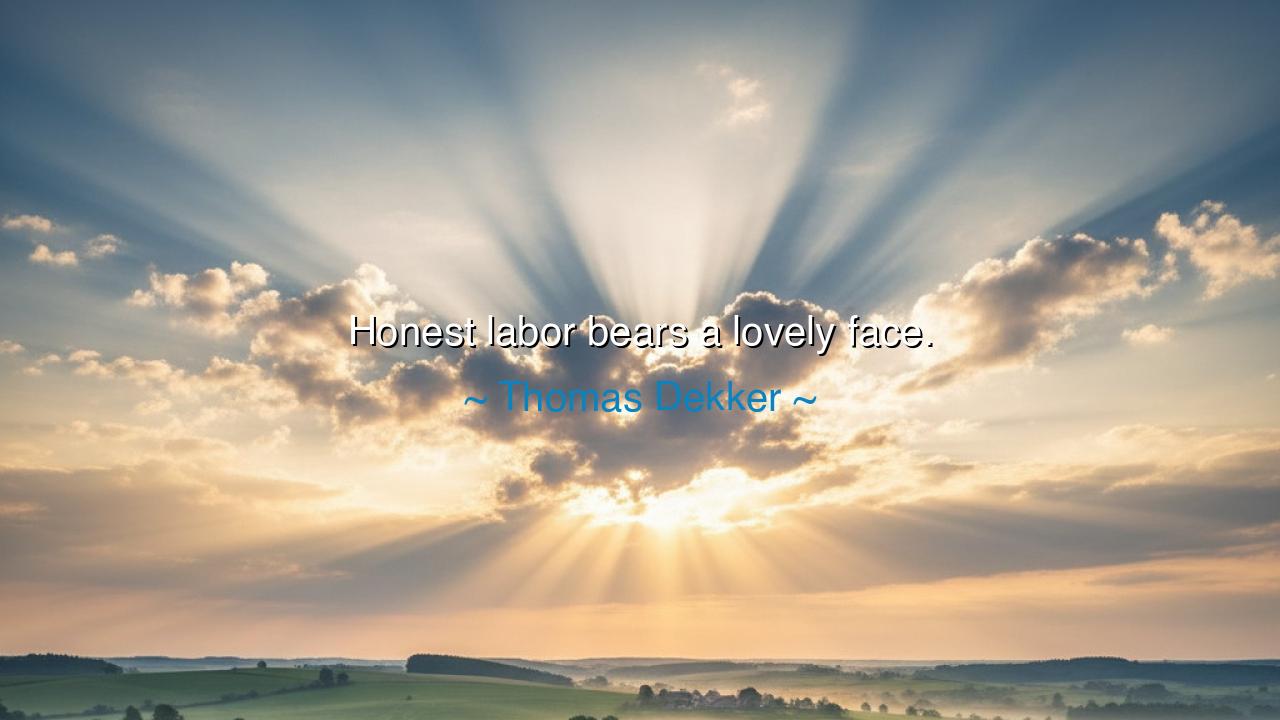
Honest labor bears a lovely face.






Hear the noble words of Thomas Dekker, poet and playwright of old, who declared: “Honest labor bears a lovely face.” In this saying lies a truth eternal—that the dignity of work, when done with integrity and humility, shines with a beauty no ornament can surpass. For the radiance of the soul adorns the countenance of those who toil with honesty.
The lovely face Dekker names is not the fleeting charm of youth nor the artificial glow of riches, but the deep and lasting beauty that springs from virtue. The hands that labor earnestly, the brow lined with the sweat of purpose, the eyes alight with pride in honest toil—these are features more noble than jewels or silks. They reveal the inner harmony of a spirit at peace with its labor.
Dekker, who walked among both nobles and commoners in Elizabethan England, knew the difference between vanity and virtue. In a world where many sought status by birth or wealth, he exalted honest labor as a crown more radiant than gold. To him, the farmer, the craftsman, the servant, all bore a beauty richer than the idle lord, for their work carried truth, while idleness carried decay.
This wisdom echoes the teachings of the ancients, who honored the dignity of labor. The Greeks saw virtue in the farmer’s plow; the Romans praised the citizen who built with his own hands; and the scriptures declared that “the laborer is worthy of his hire.” Dekker’s words stand within this lineage, lifting up work as not only necessity but honor.
Thus let the lesson endure: seek not beauty in vanity, but in integrity. Honest labor adorns the face with a loveliness time cannot wither, for it springs from the soul. When hands and heart are united in truth, the outward form reflects the inward grace. This is the beauty Dekker proclaimed—a beauty born of sweat, virtue, and the dignity of work.






MDVo Ngoc My Duyen
What I like about this quote is that it values work done with sincerity, without shortcuts or deceit. It implies that when we put in honest effort, it doesn’t just improve our circumstances—it enhances our character and how we’re perceived. But in today’s world, do we still appreciate honest labor in the same way, or are we too focused on quick results and instant gratification to recognize the beauty in hard work?
KNKhanh Ngan
This quote feels like a reminder that there’s dignity in all kinds of labor, whether it’s manual or intellectual. It suggests that the joy and fulfillment we get from putting our best into what we do can reflect in our outward appearance. But is that always the case? Sometimes, even honest labor can leave us drained or frustrated. How do we reconcile the idea of 'lovely face' with the reality of work being tough?
NKNguyen Thi Ngoc Khue
I’ve always believed that there’s beauty in hard work, but this quote makes me question what we define as 'honest labor'. Does it mean physical work, or does it include the effort we put into our passions, relationships, and personal growth? It’s an interesting thought. Can the face of someone who does emotional or intellectual labor also be described as 'lovely'? I think it depends on how deeply they invest in their work.
NTPhuong Nguyen Thi
Honest labor does indeed bring out a certain grace in people. I think it’s the integrity and commitment that shines through, making someone’s hard work look almost beautiful. But I also wonder—does this quote imply that we should always be content with hard work, even if it doesn’t lead to success or recognition? What happens when the labor is exhausting and the rewards don’t seem to come?
AT37. Anh Thu
This quote is so powerful in its simplicity. There’s something deeply rewarding about the idea that honest labor reflects a 'lovely face'. It reminds me of people I admire who work with integrity and pride, no matter what they do. However, I wonder—what if someone works hard but feels unappreciated or overburdened? Can we still say their labor bears a lovely face if it’s not acknowledged?